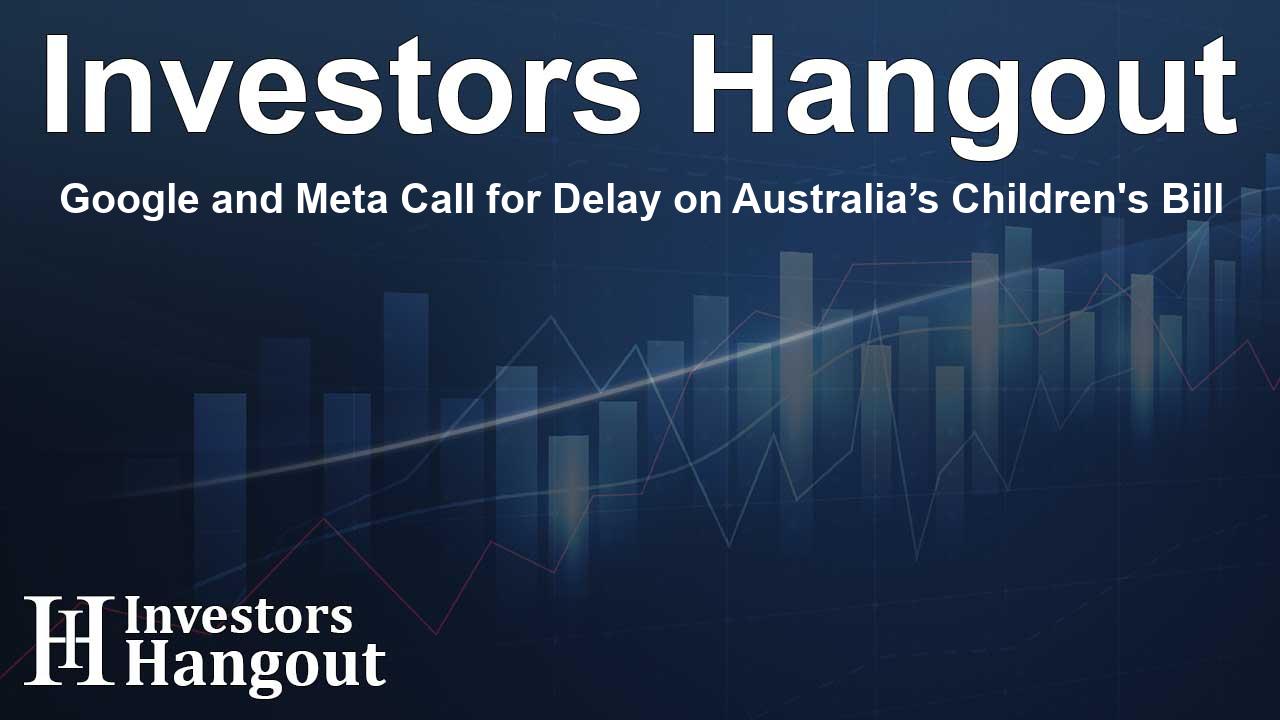Google and Meta Call for Delay on Australia’s Children's Bill

Google and Meta Seek Delay in Australian Legislation
In a significant move, tech giants Google (NASDAQ: GOOGL) and Meta Platforms (NASDAQ: META) have voiced their concerns regarding a crucial legislative bill proposed by the Australian government. This bill aims to impose a ban on most social media platforms for children under the age of 16, reflecting some of the most stringent measures against children's social media usage seen globally.
A Call for Further Review
The current Australian administration, led by Prime Minister Anthony Albanese, is eager to pass this measure before the upcoming parliamentary recess. However, both Google and Meta believe that more time is necessary to evaluate the potential ramifications of such a bill. They have stressed the importance of waiting until the results of an ongoing age-verification trial are available to understand better the implications of these new regulations.
Impact of the Proposed Regulations
The proposed age-verification system could enforce strict measures, including the use of biometrics or government-issued identification, to determine age eligibility for social media usage. The platforms would bear the responsibility of verifying users' age, rather than parents or guardians, which raises several questions regarding its feasibility and effectiveness.
Industry Reactions and Concerns
Meta has publicly stated, "In the absence of such results, neither industry nor Australians will understand the nature or scale of age assurance required by the bill, nor the impact of such measures on Australians." They expressed skepticism about the current draft of the legislation, suggesting it is both inconsistent and ineffective.
Additionally, potential penalties for non-compliance with these new regulations are substantial, with fines reaching up to A$49.5 million (approximately $32 million) for serious breaches. This has prompted criticism from various stakeholders, including the opposition Liberal party, which is expected to back the bill despite concerns voiced by independent lawmakers about the expedited process.
Concerns from Other Social Media Companies
Other platforms, such as TikTok, have also raised alarms regarding the lack of clarity surrounding the bill. They argue that significant concerns have emerged due to the government’s plan to enforce such measures without engaging in detailed consultations with experts, industry representatives, or young community members.
The Need for Thorough Legislation
In response, TikTok has articulated the necessity for introducing thorough and well-considered legislation, stating: "Where novel policy is put forward, it's important that legislation is drafted in a thorough and considered way, to ensure it is able to achieve its stated intention. This has not been the case with respect to this Bill." Their concerns reflect a desire for more inclusive discussions to shape effective policies that do not stifle communication.
Political Implications and Free Speech Concerns
Moreover, industry leaders have drawn parallels between these proposed restrictions and larger issues of free speech. Elon Musk, the head of X, has criticized the bill, claiming it poses significant risks to the human rights of children and young individuals. He argues that the legislation could infringe on essential freedoms such as expressing thoughts and accessing information freely.
The recent narrative from prominent figures highlights the tension between regulatory efforts aimed at protecting minors and the essential rights of individuals to communicate openly and share information on social media platforms.
Conclusion
As discussions continue surrounding this contentious bill, it is clear that stakeholders from various sectors are calling for a more measured approach. Both Google and Meta stress the need to prioritize understanding the complexities of age-verification systems before enacting such sweeping legal changes. As the situation develops, it remains to be seen how the Australian government will respond to these growing concerns and whether they will opt for a more deliberate examination of the implications of this legislation.
Frequently Asked Questions
What is the primary goal of the proposed bill in Australia?
The bill aims to ban most forms of social media for children under 16 to protect their online safety.
Why are Google and Meta asking for a delay?
They believe more time is needed to evaluate the age-verification trial results before implementing the legislation.
What are the potential penalties for non-compliance with the new regulations?
Companies could face fines up to A$49.5 million ($32 million) for systemic breaches of the proposed law.
What concerns did TikTok express regarding the bill?
TikTok highlighted the lack of clarity and called for better consultation with stakeholders before passing the bill.
How does the bill impact children’s rights?
Critics argue that the bill may infringe on children's rights to freedom of expression and access to information.
About The Author
Contact Riley Hayes privately here. Or send an email with ATTN: Riley Hayes as the subject to contact@investorshangout.com.
About Investors Hangout
Investors Hangout is a leading online stock forum for financial discussion and learning, offering a wide range of free tools and resources. It draws in traders of all levels, who exchange market knowledge, investigate trading tactics, and keep an eye on industry developments in real time. Featuring financial articles, stock message boards, quotes, charts, company profiles, and live news updates. Through cooperative learning and a wealth of informational resources, it helps users from novices creating their first portfolios to experts honing their techniques. Join Investors Hangout today: https://investorshangout.com/
The content of this article is based on factual, publicly available information and does not represent legal, financial, or investment advice. Investors Hangout does not offer financial advice, and the author is not a licensed financial advisor. Consult a qualified advisor before making any financial or investment decisions based on this article. This article should not be considered advice to purchase, sell, or hold any securities or other investments. If any of the material provided here is inaccurate, please contact us for corrections.
